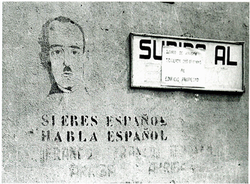
In Spain, an autonomous community is the first sub-national level of political and administrative division, created in accordance with the Spanish Constitution of 1978, with the aim of guaranteeing limited autonomy of the nationalities and regions that make up Spain.

Basque nationalism is a form of nationalism that asserts that Basques, an ethnic group indigenous to the western Pyrenees, are a nation and promotes the political unity of the Basques, today scattered between Spain and France. Since its inception in the late 19th century, Basque nationalism has included Basque independence movements.
The Republican Left of Catalonia is a pro-Catalan independence, social democratic political party in the Spanish autonomous community of Catalonia, with a presence also in Valencia, the Balearic Islands and the French department of Pyrénées-Orientales. It is also the main sponsor of the independence movement from France and Spain in the territories known as Catalan Countries, focusing in recent years on the creation of a Catalan Republic in Catalonia proper. Its current president is Oriol Junqueras and its secretary-general is Marta Rovira. The party is a member of the European Free Alliance.
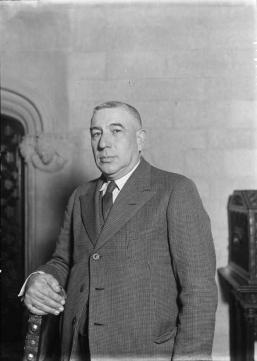
Josep Irla i Bosch was a Catalan businessman and politician. He was a deputy in the Parliament of Catalonia and the Spanish Congress in 1932, as an Esquerra Republicana de Catalunya affiliate. He was also the last President of Parliament of Catalonia at the end of Republican Catalan resistance in the Spanish Civil War, before Francisco Franco abolished the Generalitat of Catalonia. He was elected President of the Parliament of Catalonia on 1 October 1938. In office, Irla pushed for cooperation with the allies, Basque nationalists and other anti-Francoist groups, though excluding the communists. He became the President-in-exile of the Generalitat after Lluís Companys was executed. During his time as President-in-exile, he established a Government in exile, and appointed Josep Tarradellas as Conseller en Cap. He resigned as President in 1954.
Regionalism is a political ideology that seeks to increase the political power, influence and self-determination of the people of one or more subnational regions. It focuses on the "development of a political or social system based on one or more" regions, and/or the national, normative, or economic interests of a specific region, group of regions or another subnational entity, gaining strength from or aiming to strengthen the "consciousness of and loyalty to a distinct region with a homogeneous population", similarly to nationalism. More specifically, "regionalism refers to three distinct elements: movements demanding territorial autonomy within unitary states; the organization of the central state on a regional basis for the delivery of its policies including regional development policies; political decentralization and regional autonomy".

The Catalan independence movement is a social and political movement which seeks the independence of Catalonia from Spain.
The politics of Catalonia takes place within the framework of its Statute of Autonomy, which grants a degree of self-government to Catalonia and establish it as an autonomous community of Spain with the status of a nationality, operating as a parliamentary democracy. The Generalitat de Catalunya is the Catalan institution of self-government, which includes the Parliament of Catalonia, the President and the Executive Council. The Parliament of Catalonia is one of the oldest in the world.

The Parliament of Catalonia is the unicameral legislature of the autonomous community of Catalonia. The Parliament is currently made up of 135 members, known as deputies, who are elected for four-year terms or after extraordinary dissolution, chosen by universal suffrage in lists of four constituencies, corresponding to the Catalan provinces. The Parliament building is located in Ciutadella Park, Barcelona.
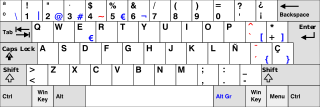
The majority of languages of Spain belong to the Romance language family, of which Spanish is the only one with official status in the whole country. Others, including Catalan/Valencian and Galician, enjoy official status in their respective autonomous regions, similar to Basque in the northeast of the country. A number of other languages and dialects belonging to the Romance continuum exist in Spain, such as Aragonese, Asturian, Fala and Aranese Occitan.
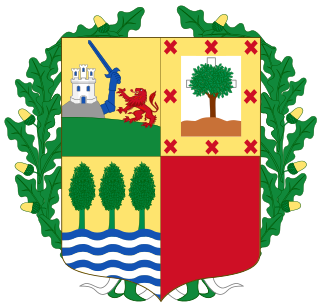
The Statute of Autonomy of the Basque Country of 1979, widely known as the Statute of Gernika, is the legal document organizing the political system of the Autonomous Community of the Basque Country' which includes the historical territories of Alava, Biscay and Gipuzkoa. It forms the region into one of the autonomous communities envisioned in the Spanish Constitution of 1978. The Statute was named "Statute of Gernika" after the city of Gernika, where its final form was approved on 29 December 1978. It was ratified by referendum on 25 October 1979, despite the abstention of more than 40% of the electorate. The statute was accepted by the lower house of the Spanish Parliament on November 29 and the Spanish Senate on December 12.

Spain is a diverse country integrated by contrasting entities with varying economic and social structures, languages, and historical, political and cultural traditions. The Spanish constitution responds ambiguously to the claims of historic nationalities while proclaiming a common and indivisible homeland of all Spaniards.

Both the perceived nationhood of Spain, and the perceived distinctions between different parts of its territory derive from historical, geographical, linguistic, economic, political, ethnic and social factors.
The Statute of Autonomy of Catalonia is a constitutional law defining the region of Catalonia as an autonomous community within the Kingdom of Spain. It was promulgated on 18 September 1979. It is one of seventeen such statutes granted, in various forms and capabilities, to the different autonomous communities of Spain since the Spanish transition to democracy of the 1970s. On 18 June 2006 a referendum altering the statute to expand the authority of the Catalan government was approved; it became effective on 9 August 2006.
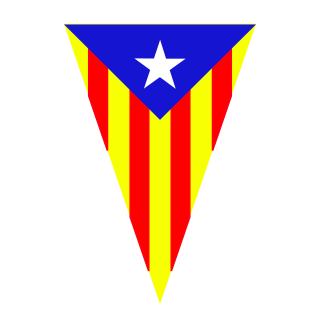
Estat Català is a pro-independence nationalist historical political party of Catalonia (Spain).
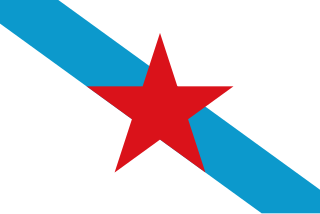
Galician nationalism is a form of nationalism found mostly in Galicia, which asserts that Galicians are a nation and that promotes the cultural unity of Galicians. The political movement referred to as modern Galician nationalism was born at the beginning of the twentieth century from the idea of Galicianism.
The Partido Galeguista was a Galician nationalist party founded in December 1931. It achieved notoriety during the time of the Spanish Second Republic. The PG grouped a number of historical Galician intellectuals, and was fundamental in the elaboration of the Galician Statute of Autonomy.
The Statute of Autonomy of Catalonia of 2006 provides Catalonia's basic institutional regulations under the Spanish Constitution of 1978. It defines the rights and obligations of the citizens of Catalonia, the political institutions of the Catalan community, their competences and relations with the rest of Spain, and the financing of the Government of Catalonia.

The Statute of Autonomy of Catalonia of 1932, also called the Statute of Núria, was the first implemented statute of autonomy for Catalonia, officially providing self-government to Catalonia for the first time in more than 200 years. The Statute was promoted by the then acting President of the Generalitat, Francesc Macià and approved in a referendum by 99% of Catalan voters. The draft Statute was completed on 20 June 1931 in Núria and finally approved in the Spanish Parliament on 9 September 1932. It was implemented until the occupation of Catalonia by the Nationalist Army during the last stages of the Spanish Civil War, in 1939.

Women in the Basque Nationalist Party in Francoist Spain were involved in leadership positions from an early period. The Basque Nationalist Party (PNV) was founded prior to the Second Spanish Republic in Bilbao, as a conservative Roman Catholic organization. They initially tried to be neutral during the Civil War, but later more openly opposed Nationalist forces. This led to repression and investigation after the war of women PNV members, and wives and daughters of male PNV members. Emakume Abertzale Batza, PNV's women political section, was operated in exile in this early period.

Basque independence is the principle and a movement for autonomy or self government for the Basque Country, independent of the Government of Spain and the Government of France.
